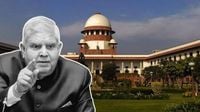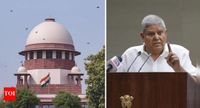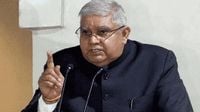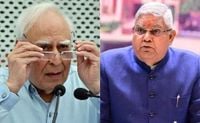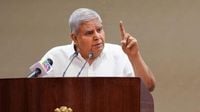In a significant display of concern over the boundaries between the judiciary and the executive, Vice President Jagdeep Dhankhar expressed serious reservations on April 17, 2025, regarding recent actions taken by the Supreme Court of India. Speaking at the valedictory function of the 6th Rajya Sabha Internship Program, Dhankhar articulated his fears that the judiciary is encroaching upon the functions of the executive branch, effectively acting as a 'super Parliament.' His comments came in light of a recent Supreme Court ruling that set deadlines for the President of India to clear bills forwarded by state governors.
Dhankhar's remarks referred specifically to the Supreme Court's directive that mandated the President to make decisions on bills within a time-bound manner. He stated, "The country never bargained for this day, for the President being called upon to decide in a time-bound manner. If the President failed to decide in a time-bound manner, the Bill would become a law." This assertion raises critical questions about the accountability of judges and the separation of powers within the Indian democratic framework.
The Vice President characterized Article 142 of the Constitution, which grants the Supreme Court broad discretionary powers to ensure 'complete justice,' as a "nuclear missile against democratic forces, available to the judiciary 24 x 7." This article allows the apex court to override existing laws or fill legal gaps, a practice that has drawn considerable criticism for enabling judicial overreach.
Dhankhar's concerns were echoed by various political figures and legal experts, who argue that the Supreme Court's recent actions could undermine the fundamental principles of accountability and governance. He questioned how the judiciary could investigate allegations against judges without the registration of a First Information Report (FIR), a process typically reserved for the executive. Referring to the alleged recovery of unaccounted cash from former Delhi High Court judge Justice Yashwant Varma's residence, he remarked, "How could an inquiry panel comprising judges be set up by the Apex Court?"
In the wake of Dhankhar's criticisms, Rajya Sabha MP Kapil Sibal countered the Vice President's remarks, emphasizing that governors and the President act on the 'aid and advice' of the council of ministers. Sibal asserted that the Governor's withholding of assent to bills constitutes an "intrusion on the supremacy of the legislature." He questioned, "If Parliament passes a bill, can the President indefinitely delay its implementation?" Sibal's comments highlight the ongoing tension between legislative authority and executive power.
The Supreme Court's April 8 ruling, which was delivered by a bench of Justices JB Pardiwala and R Mahadevan, held that once a bill is re-passed by the assembly, the Governor must assent to it and cannot reserve it for the President unless substantial changes are made. This ruling invoked Article 142 to provide 'complete justice' by deeming all ten bills cleared from the date they were re-presented to the Governor. Following the ruling, Tamil Nadu issued a gazette on April 11, marking a historic moment where bills were enacted without the official signature of a governor or the President.
While some view this landmark judgment as a necessary step to hold the executive accountable, others, including Dhankhar, see it as a dangerous precedent that blurs the lines between the judiciary and the executive. Dhankhar cautioned against a situation where the judiciary appears to direct the President, stating, "We cannot have a situation where you direct the President of India, and on what basis?" He emphasized that the Supreme Court's interpretations should stem from a constitution bench of five or more judges, as outlined in Article 145(3).
Critics of the Supreme Court's ruling argue that it dilutes the President's powers and undermines the principle of constitutional comity. Kerala Governor Rajendra Vishwanath Arlekar remarked that asking the executive to act within a time-limit on bills passed by the state legislature is neither given nor implied in the Constitution. Moreover, Attorney General of India R Venkataramani noted that the judgment was delivered without hearing the side of the President and the central government, raising concerns about the fairness of the judicial process.
Despite the backlash, some legal experts have defended the Supreme Court's actions. Former Attorney General KK Venugopal supported the judgment, asserting that the apex court was right in putting the President and the Governor on the same pedestal. Senior Advocate Rakesh Dwivedi, who represented the state of Tamil Nadu in the case, underscored the importance of clarifying the powers of the President under Article 201.
As the debate continues, the implications of this judicial intervention remain to be seen. The Vice President's strong criticism of the Supreme Court's ruling has sparked a broader discussion about the balance of power among India's democratic institutions. With calls for a review of Article 145(3) and ongoing tensions between the branches of government, the future of India's constitutional framework hangs in the balance.
In conclusion, the clash between the judiciary and the executive, highlighted by Vice President Dhankhar's remarks and the Supreme Court's recent rulings, raises critical questions about the nature of democracy in India. As stakeholders from various sectors weigh in on this contentious issue, the need for clarity and adherence to constitutional principles becomes ever more pressing.
